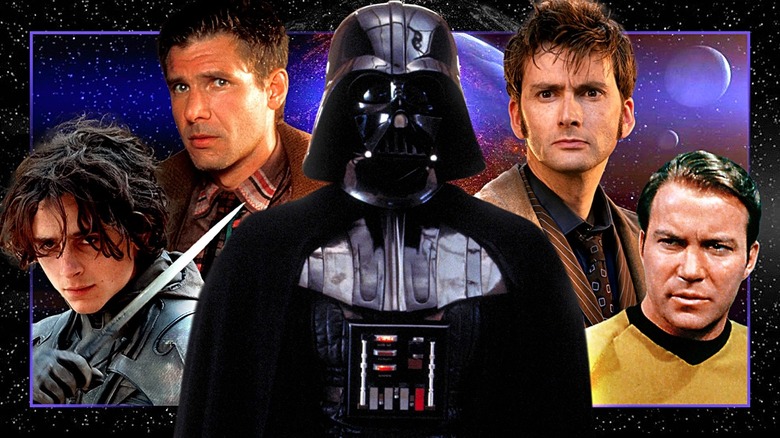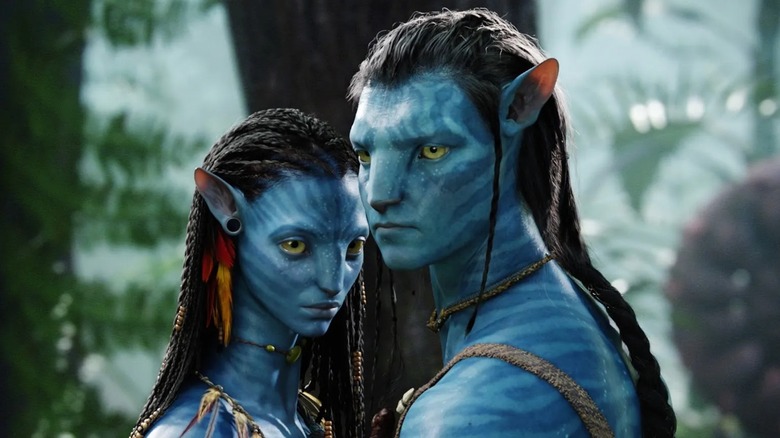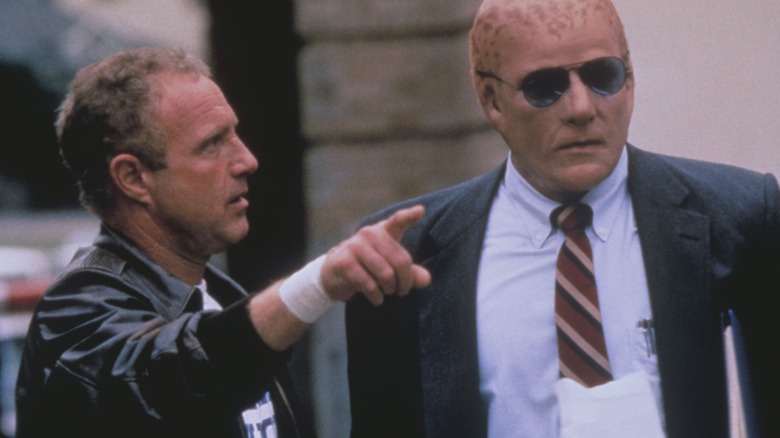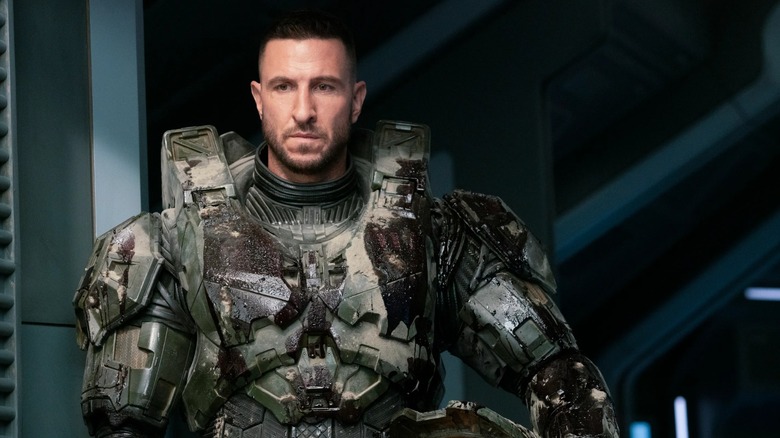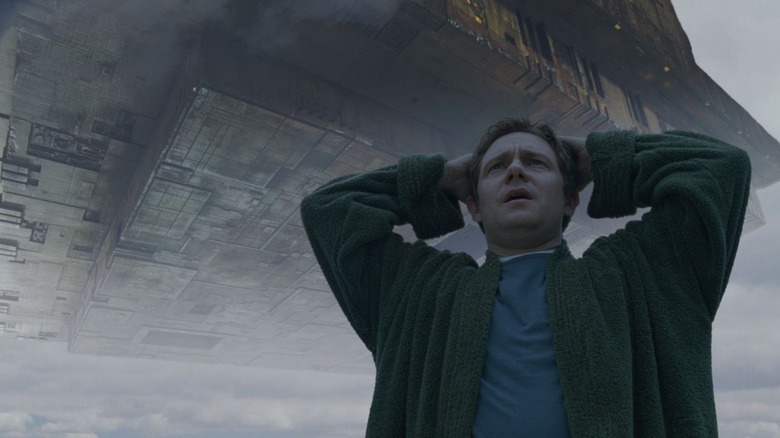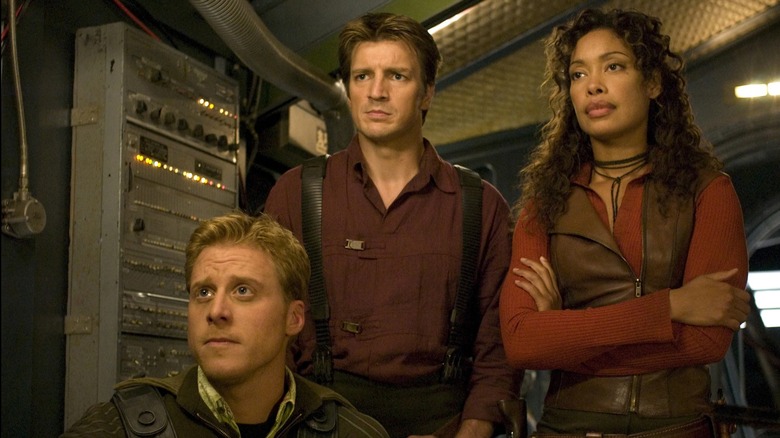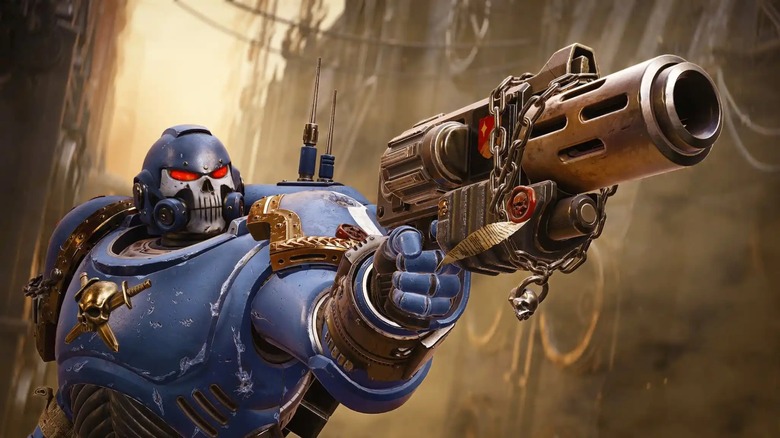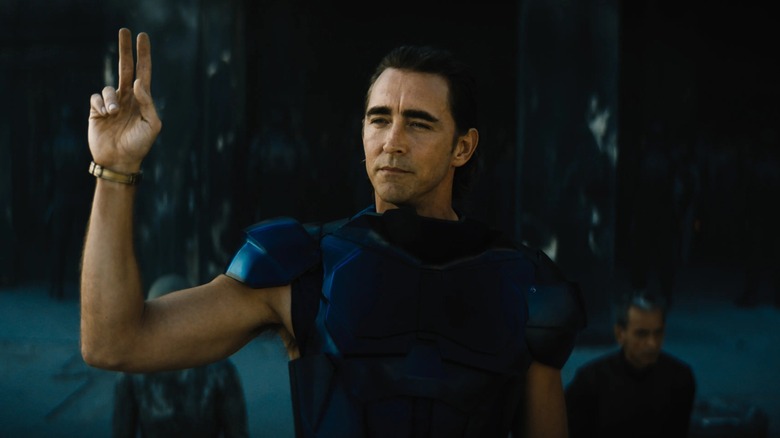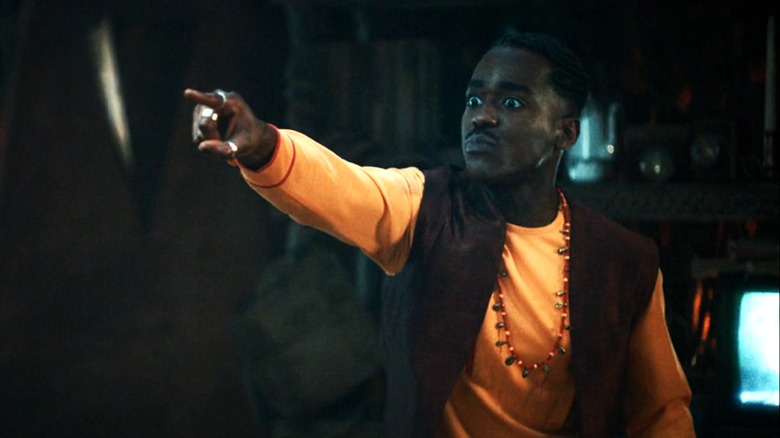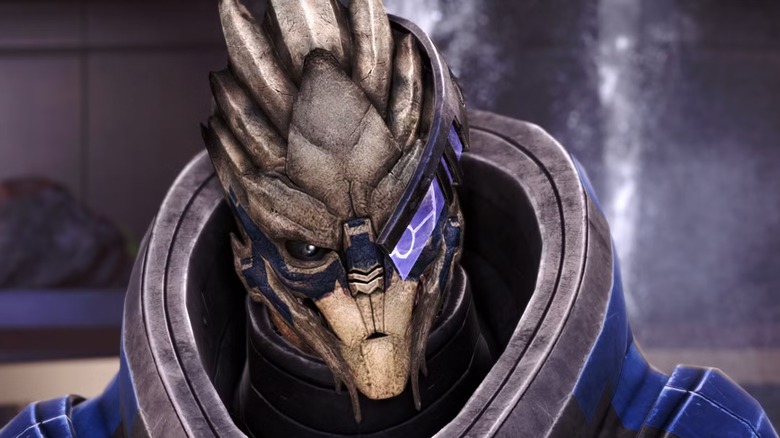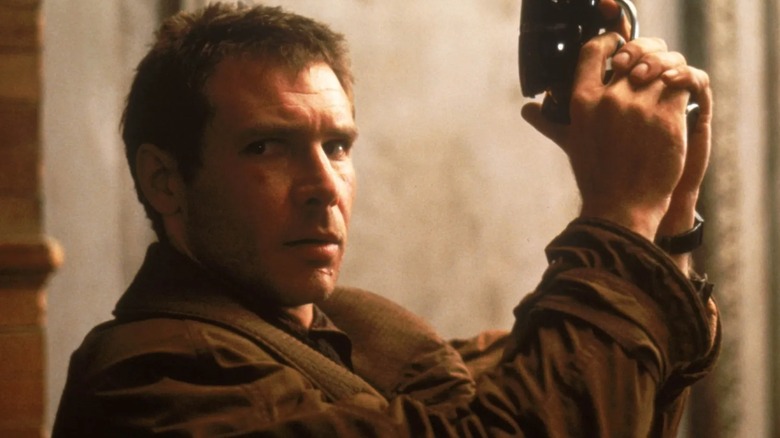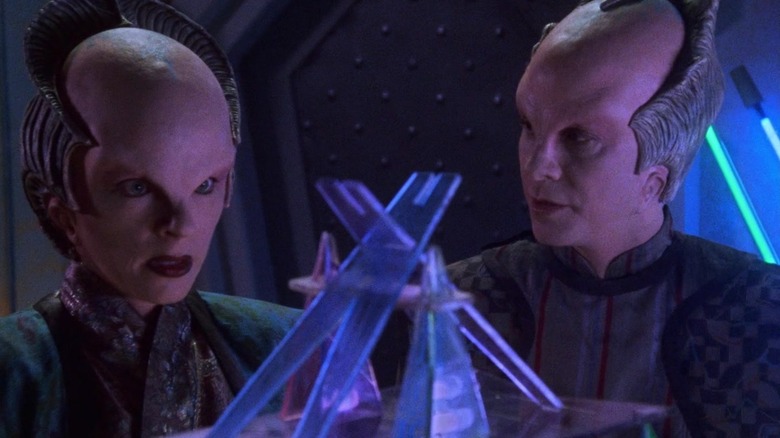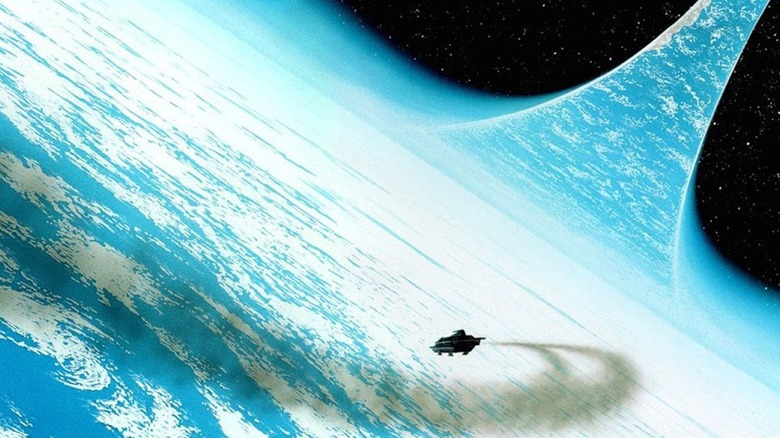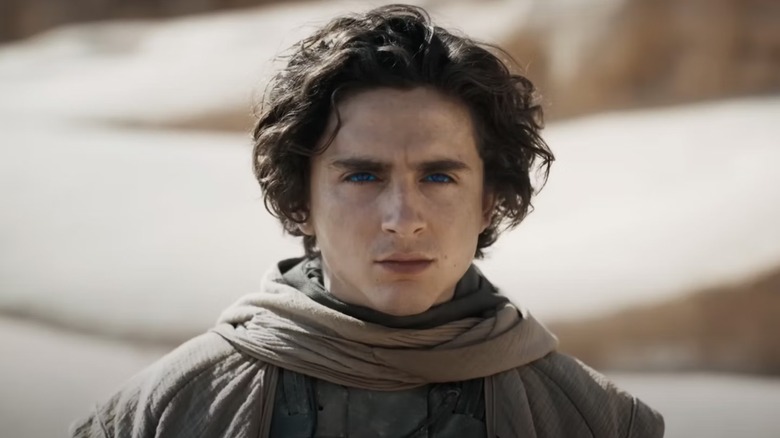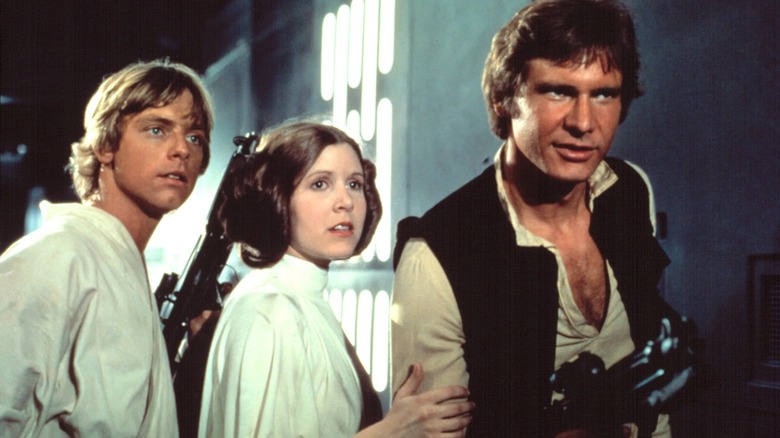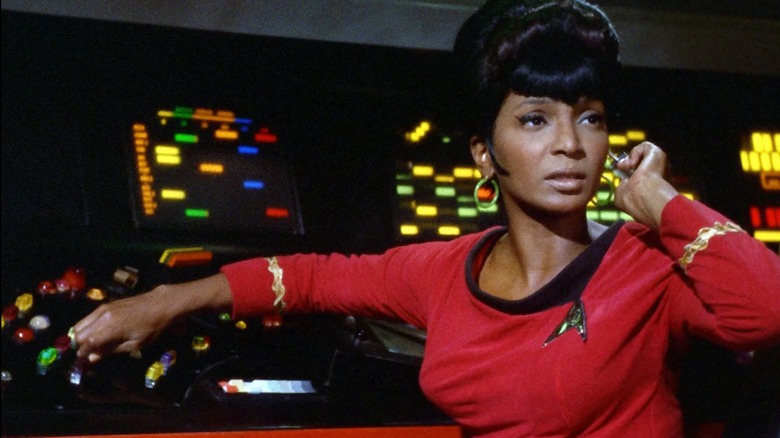The 15 Best Sci-Fi Universes Of All Time, Ranked
We may receive a commission on purchases made from links.
It's one thing to tell a story that captivates, and it's another to build a universe that could last longer than its creators dared to dream. In science fiction, fantasy, and the world of superheroes, the struggle for immortality comes with the territory. The universe your characters struggle to thrive within has its own rules, history, and myths. If you're J. R. R. Tolkien writing "The Lord of the Rings," it'll be that and more. It's a sprawling challenge for creators, but the results can be fantastic.
In science fiction, reality offers a kickstart; stories like "The Matrix" and, to a subtler extent, "The X-Files" start with the world we think we know. Then they veer wildly. It becomes speculation, asking what people will be like when the world evolves. These fictional universes become aspirational, or they can serve as warnings. But within them all is something that endures even when the characters we first met are long gone. Now, superheroes overlap with science fiction, of course. But the stakes are different, and their universes change fast. In the lands of Asimov, Clarke, and others, universes stay familiar, even when they're alien. So with that out of the way, these are the 15 best science fiction universes. Superman, we love you, but please play with your adorable Krypto for this one.
15. James Cameron's Avatar
There's something good, even great, in the effort James Cameron put into his fanfiction about giant blue people fighting the good fight against his most honorable hobbyhorse: Capitalists backed by fascism. There's also nothing wrong with being self-indulgent; it's refreshing and kind of pure. But Cameron's environments for "Avatar" are more interesting than the stories themselves. The stories are basic, even workmanlike, relying on splashes of color and special effects that go beyond the limits to get butts in seats.
Regardless of the drawbacks, the "Avatar" universe is a blockbuster franchise beyond blockbusters. The films are the spectacle itself; beautifully designed and best seen on the biggest, most luxurious screens possible. In the background is the real work; amazing environments that intertwine in ways that might even make an anti-climate change believer acknowledge the idea of Gaia. For a moment, at least. But with the story set to continue for years to come, there's plenty of time for Cameron to beat the deepest theme of "Avatar" into even the thickest skull: Nature really is beautiful, and we should be crying for it.
14. Alien Nation
Buried in the glut of cult '80s science fiction and starring a bizarre duo is a movie named "Alien Nation." Fairly known as "In the Heat of the Night" but with aliens, it's the predecessor to "District 9" you've never known you needed to watch. "The Godfather" legend James Caan is the racist (but only to the Tenctonese Newcomers) Detective Sykes. After losing his Black partner in an ironic use of the Black Dude Dies First trope, Sykes teams up with the first Newcomer to make Detective — Sam Francisco, played by "The Princess Bride" star Mandy Patinkin. No, that's not a typo, but rather a gag inspired by the generations of mistakes immigrants faced when registering at Ellis Island.
"Alien Nation" annoyed reviewers because it plays the '80s buddy cop movie dead straight, but with aliens. Fans of science fiction clicked with the flick strongly enough, however, that a primetime series with a new cast went to air — briefly — followed up with a series of movies that fleshed out any remaining cliffhangers. Amidst it all is an intricate, all-too-human look at what it's like to integrate a whole society. The fandom endures, marking a world of sociologically important speculation with all the empathy and mistakes it deserves.
13. Halo
Under the hood of Bungie's landmark video game series "Halo" is a rich mythology that pays its dues to classic sci-fi of old. From toying with Isaac Asimov's rules of robotics versus the possible endgame of AI rampancy, to acknowledging "Armor," John Steakley's legendary novel about mechanized soldiers caught in a never-ending war, the Master Chief carved out a new universe for sci-fi fans to explore.
The eponymous Halo is a ringworld of mystery (shoutout to Larry Niven, whose "Ringworld" categorized these big, weird objects for decades to come), fought over by humans and a faction known as the Covenant, all unaware that the halos are an ancient race's destructive trap for a greater threat yet called the Flood. Unfortunately, Paramount+'s "Halo" series strayed too far from these simple yet deep roots, failing completely with its second season, but the fault doesn't lie with Pablo Schreiber, who was a fantastic choice to bring the Master Chief to life. Meanwhile, the universe thrives, whether the Forerunners want it to or not.
12. The Hitchhiker's Guide to the Galaxy
You're allowed to have fun when things are at their worst, and that may be the best lesson creator Douglas Adams could have left us with when he wrote "The Hitchhiker's Guide to the Galaxy." Arthur Dent (played by Martin Freeman) is a sad sack, utterly unaware that his house is up for demolition. Meanwhile, Earth is an entire planet of sad sacks, unaware that our world is up for demolition. It's moot in 40 pages or less; it's all demolished, and the now-shellshocked Arthur is stuck hitchhiking with his buddy Ford across a galaxy that's nothing like what a humble Englishman would've hoped for.
A trilogy of six books (don't think about it too hard) emerged from a BBC Radio show, grew into a famously inexplicable text adventure game by Infocom (you can cause old gamers trauma by mentioning the Babel fish puzzle), a messy television show, and one film that's decent, although Stephen Fry is right when he says it could have been better. Exquisitely British in its irreverence, "The Hitchhiker's Guide" is a valuable reference when your life seems surrounded by Vogons, and the universe it describes remains a welcome escape.
11. Firefly
Behind the unfortunate Orientalism tropes and the troubled existence of Joss Whedon lies a show that, in its brevity, outlined a galaxy of such intrigue and historical color that science fiction fans quickly remembered what it was like to fight for a fictional universe we loved. Instead of "Spock's Brain," "Firefly" fans would be rewarded with seeing "Serenity" on the big screens, and years of comic book continuation that lets them keep flyin' even today.
Built on the history of an abandoned Earth, megacorporations up to sketchiness, and a post-civil war era where the Southern-styled rebels really do have the angels on their side (problematic implications and all), "Firefly" rides strongest on the charm of its characters, almost all of whom have gone on to bigger universes to thrive there, too. Nathan Fillion, as Captain Malcolm Reynolds, isn't just a James Gunn bestie; he's the right Guy Gardner for the "Superman" job, and Alan Tudyk, our tragic pilot Wash, is a living Disney Mascot, just to name two.
10. Warhammer 40k
"In the grim darkness of the far future, there is only war." These words are the core of "Warhammer 40k," a multimedia universe where the Emperor is a psychic Lich, space transport involves folding through a Hell that's somewhere between Sheogorath's "Elder Scrolls" madness and whatever Clive Barker's Cenobites get up to, and orks accidentally empower themselves by collectively thinking really hard that the color red will make them go faster.
Codifying the idea of grimdark science fiction so hard that it loops back around to being incredibly funny stuff, it's a universe where Manly Men and Horrifying Bug Guys are going to die the same over-the-top deaths no matter what, and it's all a good time. Amidst the stacks of arcane lore (start with the "Horus Heresy" saga and then just strap in) are video games that range from bad to highly entertaining, a ludicrously expensive tabletop game where it's more fun to ruin your eyes painting your army than watch your opponent fuddle with rulers for an hour, and, oddly best of all, a "Powerwash Simulator" DLC where you, as an Adeptus Mechanicus, get to hose down a Hawkshroud mech. Sick.
9. Foundation
Everyone has a favorite unfilmable saga, and everyone gets to wince when someone, inevitably, tries to film it. Isaac Asimov's "Foundation" saga is one of the landmarks of this epic genre; an almost anthological, occasionally non-linear, heavily cerebral collection of stories where math may be the key to saving humanity's future. Heavy emphasis on "may," as the centuries (and millennia) of this epic wear on.
It's a saga where the main character presents himself as a rather milquetoast personality, who just happens to focus on a controversial scientific niche, and who is also technically dead for most of it. Based loosely on the fall of the Roman Empire, the "Foundation" novels have a high barrier to entry at first before you realize it's incredibly gripping stuff, and the first best thing the Apple series did to successfully launch an adaptation where everyone thinks at each other was to cast Jared Harris, the man that turned info dumps into high drama in "Chernobyl," as Hari Seldon.
The unfilmable legend of "Foundation" works because it leans hard into the weirdness and melancholy at work in Asimov's novel, secret crossover with his "Robot" series and all. A foundational universe, indeed.
8. Doctor Who
"Doctor Who" is as British as afternoon tea, but it's also a universe that showed our imaginations exactly what you could do with 50 pounds sterling, a box of school-use tempera paint, and some cotton balls. That may be an exaggeration, but barely so. The Doctor is ever at their best when the chips are down, and the showrunners are at their best when the budget is John Carpenter slim.
Simple but elegant makeup tricks create lively cat people, and a silver pepper shaker forms the original silhouette of the terrifying Daleks, all of which live in a world so robust in imagination that even Queen Elizabeth II was a stout fan to the end. Human at the core, the many regenerations of our beloved Time Lord mean an immortality that goes far beyond their shifting face and stylish changes of wardrobe. The TARDIS isn't just bigger on the inside; it's eternal in a way that will inspire generations yet to come.
7. Mass Effect
As a die-hard fan of the original "Mass Effect" trilogy, and someone who thought "Andromeda" was okay, I would cordially like to say the trilogy's color-coded ending is fine. It's about the journey, not the destination, and the journey, with Keith David as our ride-or-die bestie Captain Anderson and "The Pitt" supporting star Brandon Keener voicing our top romance pick, the sexiest avian space cop ever, Garrus Vakarian, was top of its class.
BioWare's towering space epic took classic science fiction ideas and made them bigger. From space zombies and hive mind robots to alien psychics and terrifying, eldritch monstrosities threatening to wipe existence from the galaxy, we were enthralled. From the first time we truly behold one of the Reapers, we know we're experiencing something on a scale grander than anything the developer had tried before. The spirit of "Mass Effect" endures as not just one of the best science fiction universes but also as a video game universe.
6. Blade Runner
"Blade Runner" consists of two movies, a handful of animated short films, some comics, one classic 1997 video game, the unofficial but spiritually connected Kurt Russell flick "Soldier," and an upcoming Amazon series set another 40 years after "Blade Runner 2099." Not bad for something vaguely based on a Philip K. Dick novel, where the film's iconic noir elements seem less important than an ecological horror story where we're no longer sure what's real and what's robotic — or how much it matters in a world on the failing edge of climate apocalypse.
Yet "Blade Runner" is, at its core, entirely about that. Setting aside this universe's landmark role in codifying how we visualize cyberpunk (that's why this is here, and not "The Matrix"), the question of if true life can be synthesized, or can androids, as Rob Zombie quotes it, become "more human than human" is asked in every piece of "Blade Runner" media, and the answer is almost always yes. The replicant Rachel isn't just locked in a strange, violent romance; in "2049," she becomes an Eve to a new generation of life.
5. Babylon 5
"Babylon 5" is a strange but beautiful beast. Created by eccentric atheist J. Michael Straczynski, the troubled Babylon station isn't just a semi-safe truck stop in a galaxy constantly on the edge of war. It's a bastion of hope in a conflict of politics, of faith, and of humanity, in a very specific and collective sense.
After debuting in 1994, it wasn't long before the series dove head first into its big themes: the scars of a war that almost destroyed humanity, the Minbari agony as they reconcile with the secret that actually stopped that war, the imperialistic Centauri again enslaving the Narn, whom they regard as "savage" and "fanatic," and the rise of a shadowy, almost pure evil bent on scouring the galaxy. And then Earth is taken over by a fascistic, paranoid, and increasingly dangerous president, who turns its police and volunteer forces into secret militias and stormtroopers. When we say "Babylon 5" still feels on the nose today, we're saying it from the heart. It's a universe that thrives on the fandom's love, and Straczynski's efforts to bring it back to life wherever possible.
4. The Culture
The highest ranked book-only universe on this list is here for damn good reason. Iain M. Banks began outlining his universe in 1987 with "Consider Phlebas," and it's become the benchmark for alien anthropology in science fiction. Other writers, like C.J. Cherryh, come close to this apex, but "The Culture" is special. A sort-of collectivist empire comprised of mostly humanoid-alien post-scarcity civilizations who've left their daily operations to intricate AI networks (Minds), these seemingly gentle folk have also evolved their toolkit to the point that they could eradicate opposing races in a blink and not even remember it a week later. But only if they absolutely had to.
The Culture, for fun, spends their centuries futzing around with other races until they're Culture-compatible. They do this in generally ethical, moralistic ways, because of the Culture's, well, culture, but the results can be... interesting. The Culture isn't even the only mega-society in the universe of "The Culture," and they're not always the most powerful one. Banks' nine-novel saga, which only ended because he died in 2013, is not one to be missed by fans of imaginative space opera. And you'll have to read it, because if anything is truly unfilmable, The Culture probably is. Amazon has promised an adaptation of "Consider Phlebas" multiple times over the years, including in February 2025, and Culture fans are not optimistic about its chances.
3. Dune
If a universe is on this list, by now, it's clear it's a landmark for the science fiction genre. "Dune" opens our top three, where these universes are beyond landmarks and have shaped not only the genre, but some aspect of the real world. For Frank Herbert, "Dune" wasn't just a wild space epic about millennium empires and the capacity of the human mind. It was an ecological treatise, a story that begins with a hostile desert world in turmoil, and gradually explores the importance of understanding and preserving its unique qualities. The real-life parallels to OPEC and the treatment of oil-providing lands, much less environmentalism in general, are writ large.
For fans, then, it's weird and frustrating that every adaptation of "Dune" to date belies the importance of Dr. Liet-Kynes (a misused Max von Sydow in David Lynch's "Dune," Sharon Duncan-Brewster in Denis Villeneuve's version). Arrakis' chief ecologist sees their role highlighted as an Imperial plant, though the 2021 version does a better job showing not just their competency but the ways in which they became one with their chosen home.
2. Star Wars
Teetering on the edge of space fantasy, where jiu-jitsu wizards use mind magic and laser swords, "Star Wars" nonetheless keeps its toes firmly in science today with the help of creators like Tony Gilroy, who drive home the human cost of rebellion in any reality, and Timothy Zahn, who, through Grand Admiral Thrawn (Lars Mikkelsen) helped make military tactics and the understanding of the weapons of war into a greater necessity. While the space wizards kept doing their cool stuff.
Yet "Star Wars" held its science fiction edge early on, exploring strange worlds with their own environmental rules, and dozens of alien races, all of whom had customs and rituals that would matter. This universe is a playground above all others, because almost anything can happen to anyone, and anyone can become the hero the galaxy needs — so long as it also reminds us why it's very important to struggle against fascism and cruelty.
1. Star Trek
Without "Star Trek" becoming a global phenomenon, it's hard to imagine what the world would be like today. From its first airing in 1966, the franchise became a way to explore real dilemmas, from racism to the right to life, and put old and new science fiction ideas to the test. Along the way, it would inspire generations, creating astronauts out of curious children, inspiring cutting-edge inventions, and paving the way for Black women to see themselves and recognize the value they deserved.
Uhura actress Nichelle Nichols remains a NASA inspiration years after her death, while Leonard Nimoy's Spock, among many highlights, also became a lightning rod for autistic fans who would later feel even more seen by Brent Spiner's Data. With inclusivity at its heart and a guiding mission to explore new worlds and new civilizations, the universe of "Star Trek" is about creating hope as we continue on towards unknown futures. Without it, humanity just wouldn't be the same.
